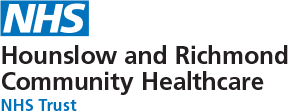Who we are
Richmond Community Neuro Rehabilitation Team (CNRT) is an NHS service for adults with a neurological condition.
The team provides specialist neuro rehabilitation:
-
Physiotherapy (PT)
-
Occupational Therapy (OT)
-
Speech and Language Therapy (SLT)
-
Dietitetics
-
Specialist Nursing (for Multiple Sclerosis, Parkinson's, Stroke, Wellbeing)
The team is supported by therapy assistants and administrative staff.
What we do
We work with people, their family and carers to help achieve the best quality of life in all aspects of daily living.
We help people use tools and strategies to manage any related difficulties and work towards goals set by them.
Therapy is delivered in the most appropriate setting, either as an outpatient at Richmond Rehabilitation Unit, at home or in the community.
We also provide a Stroke Early Supported Discharge (ESD) service. This is an intensive rehabilitation service for stroke patients to facilitate early discharge home from hospital.

We see adults with a neurological diagnosis and whose primary presenting need is related to that condition.
This service is for people who live in Richmond and have a Richmond GP.
Neurological conditions include; Stroke, Parkinson's (PD), Multiple Sclerosis (MS), Traumatic Brain Injury (TBI), Motor Neuron Disease (MND), Huntington's Disease (HD).
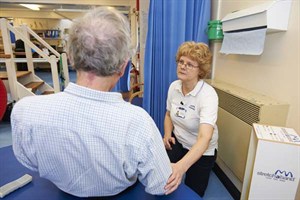

We are a team of specialist Physiotherapists (PT) with experience in treating people with neurological conditions. Our assessments and treatment programmes use detailed analysis of movement and how it impacts on every day function.
The aim with all treatment programmes is to help people self-manage the condition as much as possible and to support family and carers.
What we do
We provide:
-
Assessment of postural control and movement
-
Assessment of motor skills - bed mobility, transferring, sitting and standing balance, walking, managing stairs and getting up from the floor
-
Exercise programmes
-
Re-education of balance and gait
-
Provision of appropriate walking aids including orthotics and/or referral to a specialist clinic
-
Spasticity management including referral to spasticity clinic and provision of timely rehabilitation following Botox injections
-
Positioning and posture advice
-
Exercise and balance classes
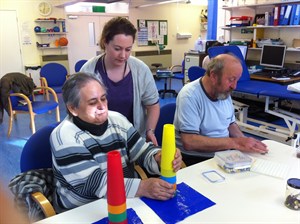

We are a team of specialist Occupational Therapists (OT) with experience in treating people with neurological conditions.
The aim with all treatment programmes is to help you self-manage your condition as much as possible and to support family and carers.
What we do
Occupational Therapy provides practical support to help increase independence, enabling people to do the activities that matter most.
For example, we help people manage:
-
Personal care tasks (e.g. washing and dressing)
-
Household tasks (e.g. cooking and cleaning)
-
Returning to work (vocational rehabilitation)
-
Leisure and social activities
-
Arm and hand function
-
Functional mobility and transfers
-
Fatigue
-
Adapting to changes in vision/perceptual difficulties (e.g.hemianopia)
-
Changes in cognition (e.g. memory, attention)
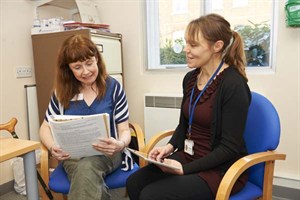

We are a team of specialist Speech and Language Therapists (SLT) trained to treat communication and swallowing disorders for people with a neurological condition.
We also see people who not have a neurological condition (such as, dementia) for swallow assesment and advice (dysphagia). We are not commissioned to support people with communication difficulties related to dementia or other non neurological conditions.
What we do
We assess, diagnose and, where appropriate, provide goal-led therapy programmes to support aquired communication difficulties relating to their neurological condition.
For example:
-
Dysarthria (unclear speech): difficulty achieving clear or loud speech secondary to a neurological condition
-
Aphasia (language impairments): difficulties understanding and expressing spoken or written language
-
Cognitive Communication Disorder: communication disorder primarily associated with cognitive impairment
We provide direct therapy as well as education, advice and support to family and carers, includig referrals to local support groups.
We assess, diagnose and provide safe swallowing recommendations for people with swallowing difficulties relating to the mouth and throat (oral-pharyngeal dysphagia). Please note: oesophageal stage difficulties should be referred to Gastroenterology.
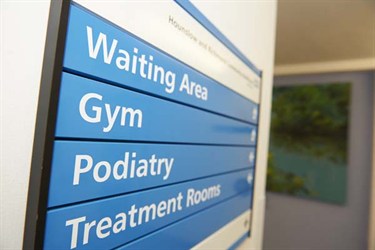

A specialist Dietitian who provides specialist advice and information on food and nutrition choices for people with a neurological condition.
What we do
-
Provide evidence based advice about nutrition and health for a range of neurological conditions
-
Advise on food related problems, treatments and disease
-
Advise on dietary management to help prevent further health complications
-
Provide tailored dietary advice to help meet nutritional needs
-
Work jointly with other professionals e.g. Speech and Language Therapists for people with dysphagia (swallowing problems)
-
To support people with their decision regarding artificial nutritional support e.g. Percutaneous Endoscopic Gastrostomy (PEG)
Who we are
A team of specialist nurses:
- Parkinson's Nurse
- Multiple Sclerosis Nurse
- Neuro Wellbeing Nurse
- Neurology Nurse
What we do
-
Provide specialist nursing assessment and advice to help manage the condition
-
Provide support and information to patients and carers
-
Work closely with our neuro therapists to provide responsive and effective care
-
Provide a link between other community and hospital services
-
Case management of patients with complex needs
-
Education and training for health and social care professionals
Please see the list below for local services that may be useful.
Local support groups and services
Services.thejoyapp.com (search for local activities by postcode/category)
Age UK (Range of advice, activities and support services, e.g. shopping, handyman, befriending,cleaning)
Richmond Aid (counselling servies and benefits/financial advice)
RUILS Independent Living (provide information, advice and activities)
FiSH Neighbourhood Care (support with shopping/transport/other activities in Barnes, Mortlake, East Sheen)
Kew Neighbourhood Association (support with shopping/transport/befriending in Kew)
Exercise, activities and social groups
Integrated Neurological Services (INS)
Parkinson's Can Dance- Ballet Boyz
Dance For Parkinson's - Rambert
Twickenham Wellbeing Centre (Age UK)
Whitton Social Centre (Age UK)
Psychological support
NHS Richmond Talking Therapies
NHS Mental Health Support Line
Support services for carers
(e.g. carers include partners,family, friends who support the person with the neurological condition)
Richmond Carers Centre (offer signposting and support services)
Integrated Neurological Services (INS) (counselling and support/advice services)
Richmond Social Services (carer's assessment and benefits)
NHS Social care and support guide (navigating support services)
Equipment and home living aids
NRS - for repairs or replacement of equipment provided by NHS
Wheelchair Services (NHS Richmond)
Wheelchair Loans - Wheelfreedom
Opt4Mobility Aids Mobility Shop
DISCLAIMER: We are not responsible for the content or reliability of the websites/organisations we link to. Due to the very nature of the internet, we can not guarantee that the sites we link to will always be available.
Falls
Pressure Ulcers
Pressure ulcers (also known as pressure sores or bedsores) are injuries to the skin and underlying tissue, primarily caused by prolonged pressure on the skin.
They can happen to anyone, but usually affect people confined to bed or who sit in a chair or wheelchair for long periods of time
www.nhs.uk/conditions/pressure-sores
Sepsis
Anyone with an infection can get sepsis. It can be life threatening and difficult to spot. Please see link below for more information on symptoms and advice.
Urinary Tract Infection (UTI)
If you are concerned that you may have a UTI, please see the link below for a list of symptoms and advice
www.nhs.uk/conditions/urinary-tract-infections-utis
Chest infection
If you are concerned that you have a chest infection, please see the link below for a list of symptoms and advice
Referrals
We see adults (18 years+) with a neurological diagnosis and whose primary presenting need is related to that condition. This service is for people who live in Richmond and have a Richmond GP.
The Speech and Language Therapists also see people who have an acquired or long term dysphagia (swallowing difficulty) and do not need to have a neurological condition.
How to refer
Richmond Community Neurological Rehabilitation referrals are accepted from GPs and other health and social care professionals.
All referrals should be made via Single Point of Access (SPA) using the form linked below.
No referrals will be accepted via phone or email.
Richmond Stroke Early Supported Discharge referrals are accepted directly from Stroke units. Please use this ESD referral form and send via SPA.
Exclusion Criteria
-
Learning disability
-
Mental health problem
-
Substance misuse (ongoing)
-
Dementia (however the SLT service provides swallow assessment and advice for these patients)
-
Traumatic injury or new medical condition unrelated to their neurological condition. E.g. a fracture or pneumonia
-
Multiple active unresolved medical needs taking priority over their underlying neurological condition
-
Peripheral neuropathies – discuss on an individual basis
-
Single nerve palsy related to trauma
-
Nerve root involvement related to disc protrusion
-
Non-organic conditions (e.g. functional neuro disability) and M.E
-
People whose needs are for equipment or environment adaptation only- please contact Richmond Social Services Adult Access team on 020 8891 7971
-
People with a voice disorder. Please refer to Specialist Voice Therapy SLT Team via SPA
-
People with a developmental or acquired stammer
-
People with difficulty swallowing secondary to an oesophageal diagnosis
-
People with communication difficulties secondary to dementia
-
People with communication difficulties relating to a learning disability or mental health problems
-
Support with enteral tube feeding (Kingston Hospital Dietetic Department support with this)

